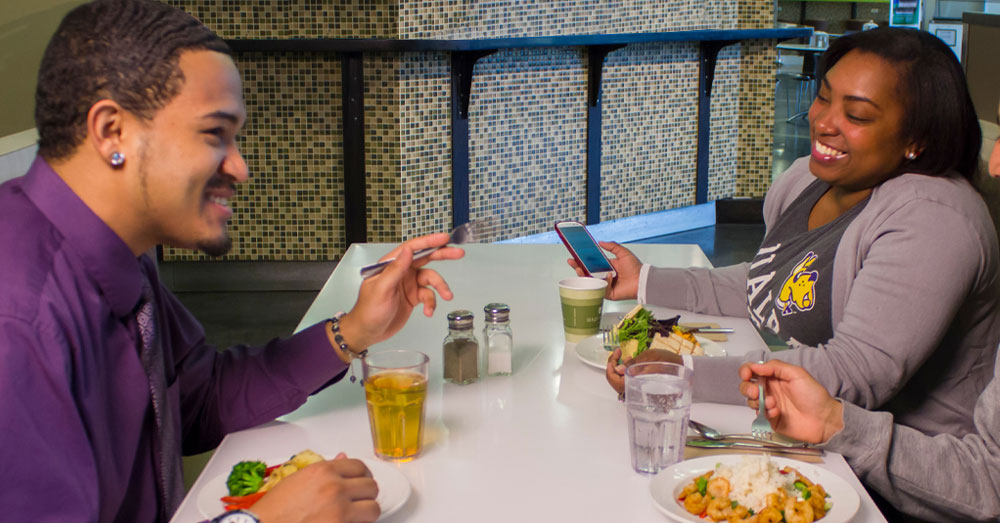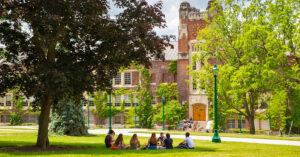It’s hard to succeed on an empty stomach. If it’s difficult to maintain a nutritious diet, it can be difficult to complete day-to-day tasks with the quality needed to be successful. If you or someone you know is having trouble affording groceries, SNAP, campus food pantries, and other community supports may be able to help. Summer Meals are also available for parenting students, or anyone age 18 or under. Let’s learn more about these programs and how they can help you or someone you know avoid food insecurity.
Supplemental Nutrition Assistance Program (SNAP)
The Supplemental Nutrition Assistance Program (SNAP), formerly called Food Stamps, is the largest federal program providing monthly benefits to purchase food for all who meet eligibility guidelines. Unfortunately, few students who are in need recognize and enroll in SNAP. A national survey conducted in 2020 by the HOPE Center found that only 24% of students at two-year colleges and 11% at four-year colleges used SNAP.
SNAP rules limit who can qualify for the program, and navigating student eligibility can be confusing and challenging to navigate. If you need help applying for SNAP, county Nutrition Outreach and Education Program Coordinators can tell if you may be eligible and help you gather the documents you need and fill out and send in your SNAP application. You’ll also get information on other programs that may help stretch your food budget, like school meals and summer meals for kids. The service is free and confidential.
Access to SNAP is intended for those who truly need the support. Students enrolled at least half-time may be eligible if they are income-eligible and meet one of the following criteria. Please note there are additional eligibility rules that all SNAP applicants must meet to qualify.
- Single parent enrolled full-time and responsible for a dependent child age 12 or under;
- Responsible for a dependent child under the age of 6;
- Responsible for a dependent child between ages 6-12 where adequate childcare is not available;
- Receiving Family Assistance (FA), Safety Net Assistance (SNA) or Unemployment Benefits;
- Attends a State University of New York (SUNY) or City University of New York (CUNY) community, comprehensive, or technical college and is enrolled in a qualified certificate or degree in a Career and Technical Education (CTE) program.
- Attends an Educational Opportunity Center (EOC) and is enrolled in a qualified CTE program, remedial courses, basic adult education, literacy, or English as a second language;
- Works an average of 20 hours per week;
- Mentally or physically unable to work;
- Participating in a state or federally funded work-study program, regardless of the number of weekly hours;
- Participating in an on-the-job training program; or
- Receives less than 50% of their meals from a college meal plan.
In addition, there are temporary exemptions that will expire 30 days after the COVID-19 federal public health emergency is lifted. These exemptions are for students:
- Eligible to participate in state or federal work-study, regardless if the student is actively employed or participating in work-study; OR
- With an Expected Family Contribution (EFC) of $0 in the current academic year under federal student financial aid rules.
Students remain eligible for SNAP during the summer and other school breaks if they plan to continue their education during the next semester. Students can apply between semesters if they intend to register for the next school term.
Summer Meals Program
Summer Meals provide free meals and snacks for kids and teens ages 18 and under at sites all across New York. Participants can get free, healthy meals at nearby places like parks, community centers and libraries. Meals vary, but all include healthy foods like fruits, vegetables, grains, and protein. There is no need to sign up, you can just show up!
Hunger Solutions NY helps you find Summer Meal sites in every region of the state, or you can also text “food” to 304-304.
Campus Food Pantries
All 64 SUNY Schools have a food pantry or stigma-free food access available for students in need. The summer months may impact some pantry hours, however, many SUNY food pantries are open during the summer to provide the goods many students need all year long.
For example, the SUNY Potsdam Food Pantry is open all summer from 7 AM-11 PM, 7 days per week. In addition to the goods normally available, generous neighbors often drop off fresh produce from their gardens and CSAs. UAlbany’s Purple Pantry is open this summer on Mondays from 2 PM-4 PM and Wednesdays 9:30 AM – 11:30 AM. Students can utilize the shopping pantry to select their own items.
Stony Brook’s Food Pantry is open Monday through Friday from 10 AM – 4 PM during the summer months. With over 400 students living on campus for work, summer classes, research, etc. Stony Brook is happy to be able to continue offering a supplemental food option for students, faculty, and staff throughout the summer. Schenectady Community College is open four days a week all summer. In addition to usual pantry offerings, they also try to include summer treats like freeze pops and the ingredients to make smores. Poly Pantry located at SUNY Polytechnic Institute is open Monday through Friday from 8 AM – 4 PM. Shelves are stocked with food and non-food items including hygiene, laundry, and cleaning products.
The C3 Pantry at Mohawk Valley Community College is open all summer (except holidays), Monday through Friday from 8:30 AM-4:30 PM, and is available to any MVCC student. The C3 Pantry has non-perishable food items, frozen meals, dairy and non-dairy items, fresh fruits and vegetables (some will even come from the Community Garden on the Utica Campus!), various hygiene items, diapers/ baby wipes, cleaning supplies, and laundry detergent. Assistance is also available to students with completing applications for SNAP, Emergency HEAP, and other services from DSS.
Many other SUNY campus facilities will maintain operating hours through the summer for students and staff. You can learn more about how to apply for SNAP and the other food insecurity resources SUNY makes available at suny.edu/foodinsecurity.




